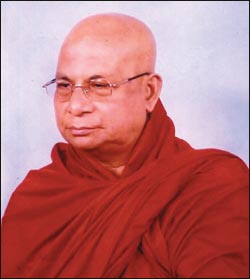|
Sri Lanka and GSP+:
Challenges ahead
Aggamaha Panditha Venerable Kotugoda Dhammawasa
Anunayaka Thera
Archaeological excavations conducted so far have confirmed that Sri
Lanka’s heritage extends to pre-historic times. The artifacts unearthed
and examined by experts both local and foreign have revealed that the
island’s history goes back to over 10,000 years. These include the
period of the legendary Rama and Ravana.
In very ancient times Sri Lanka was linked to Southern India by land
around 4000 years ago nature’s upheavals such as earthquakes, sea
erosion and tsunamis caused the island to become gradually separated
from the island subcontinent.
Indian epic Ramayana
According to the Indian epic Ramayana, Hanuman and his army invaded
Sri Lanka by using the still - visible stone ‘bridge’ (now submerged)
following Indian Prince Rama’s dispute with Lanka’s King Ravana over the
abduction of Princess Sita. This story proves the close connections
between the two countries.
|

Aggamaha Panditha Venerable
Kotugoda Dhammawasa Anunayaka Thera |
The introduction of Buddhism to Sri Lanka by Arahat Mahinda, son of
Indian Emperor Dharmashoka was the beginning of a new and vigorous
chapter in the island’s history. Since then an unshakable bond has been
forged between India and Sri Lanka. We should not forget that our
predominant religion, our arts and craft, farming methods, food recipes,
clothing styles, medicines and treatment of diseases all came from
India. Apart from these, the Sinhala people too migrated from the North
of the subcontinent. Needless to say Tamils too came from India.
Global village
The Muslims (Moors) arrived in the island from India and the
Middle-East for trade purposes and settled here.
The Portuguese, the Dutch and finally the British colonized Sri
Lanka, expanded their empires and strengthened their economies. Today
tremendous advances in science and technology have turned the modern
world virtually into a global village via satellite communication and
the Internet. We cannot think of any other era in which our world had
reached such high levels in scientific, technological and economic
progress. Educational standards have greatly improved and humanitarian
services have expanded. Facilities are in place to provide urgent relief
to victims of disasters more than at any time in the past. Improved
international relations and unity among the Western powers on many
issues have helped to stabilize and strengthen their societies.
However it appears that the west is not adopting the correct policy
in relation to problems facing developing nations like Sri Lanka. The
time has come for them to adopt a more reasonable and sympathetic
approach to these countries.
Immense destruction
As a South Asian nation Sri Lanka experienced terrorism for almost
three decades and most people-both foreigners and locals-believed that
the problem could never be solved. It is the correct strategy that
President Mahinda Rajapaksa adopted in military dealing with the enemy
that finally helped to bring relief to the people. All communities-Sinhala,
Tamil and Muslim-supported the President in his successful effort to
defeat terrorism that caused immense destruction to life and property
and damaged the economy for 30 long years. All peace-loving and
law-abiding citizens were determined to see that this scourge should end
once and for all.
No government in the world has been able to fully protect human
rights in times of war. In Sri Lanka our Security Forces safeguarded
human rights to the best of their ability during the fighting. In fact
even before the war ended, a ‘train of brotherhood’ left late last year
for Vavuniya in the North from Matara in the South taking relief items
to thousands of Tamil civilians displaced by the fighting. These items
were voluntary contributions by people and organizations in the South.
European Union
Yet it is regrettable that the European Union is considering the
withdrawal of GSP (Generalized System of Preferences) plus concessions
accusing Sri Lanka of violating human rights. Thus our Government has
been charged with violating the conditions of the relevant agreement
between this country and the EU.
If the GSP Plus concessions are withdrawn it will adversely affect
the livelihoods of over 250,000 garment factory employees in Sri Lanka.
The industry indirectly supports around a million of the island’s
population of 20 million. Those who are bound to suffer as a result of
withdrawing the concessions will be not only Sinhala but also Tamil and
people of other ethnic groups.
Even retail shop owners in Britain have urged the European Commission
not to penalise Sri Lanka’s textile and garment industry workers or
British shoppers by not extending the GSP Plus concession over human
rights issues. According to media reports, the British Retail consortium
has warned that the removal of the concession for cheap, good quality
clothes imported from Sri Lanka could put up customer prices in the
United Kingdom.
If the EU thinks it has a dispute with Sri Lanka, the problem should
be discussed and resolved at diplomatic level with the Government
instead of penalizing ordinary Sri Lankans. As a member of the United
Nations, Sri Lanka has abided by international regulations and has
worked in close cooperation with the European Union and other countries
to date. We have never gone to war with any other country.
Victory over terrorism
It is quite clear that Sri Lanka’s victory over terrorism after 30
years has been a bitter blow to LTTE sympathizers all over the world.
Consequently the enraged Tiger supporters have launched a campaign of
vilification against this country. It is obviously an attempt to tarnish
the island’s global image. That some foreign governments have been
deceived by this misinformation has saddened our people.
Hence the ordinary citizens and the Maha Sangha of Sri Lanka most
humbly wish that the European Union will do a proper study of the
situation here and reconsider its move to withdraw the GSP Plus
concessions.
Ven. Kotugoda Dhammawasa Anunayaka Thera is the President of Sri
Lanka Amarapura Maha Sangha Sabha (Assembly) |



